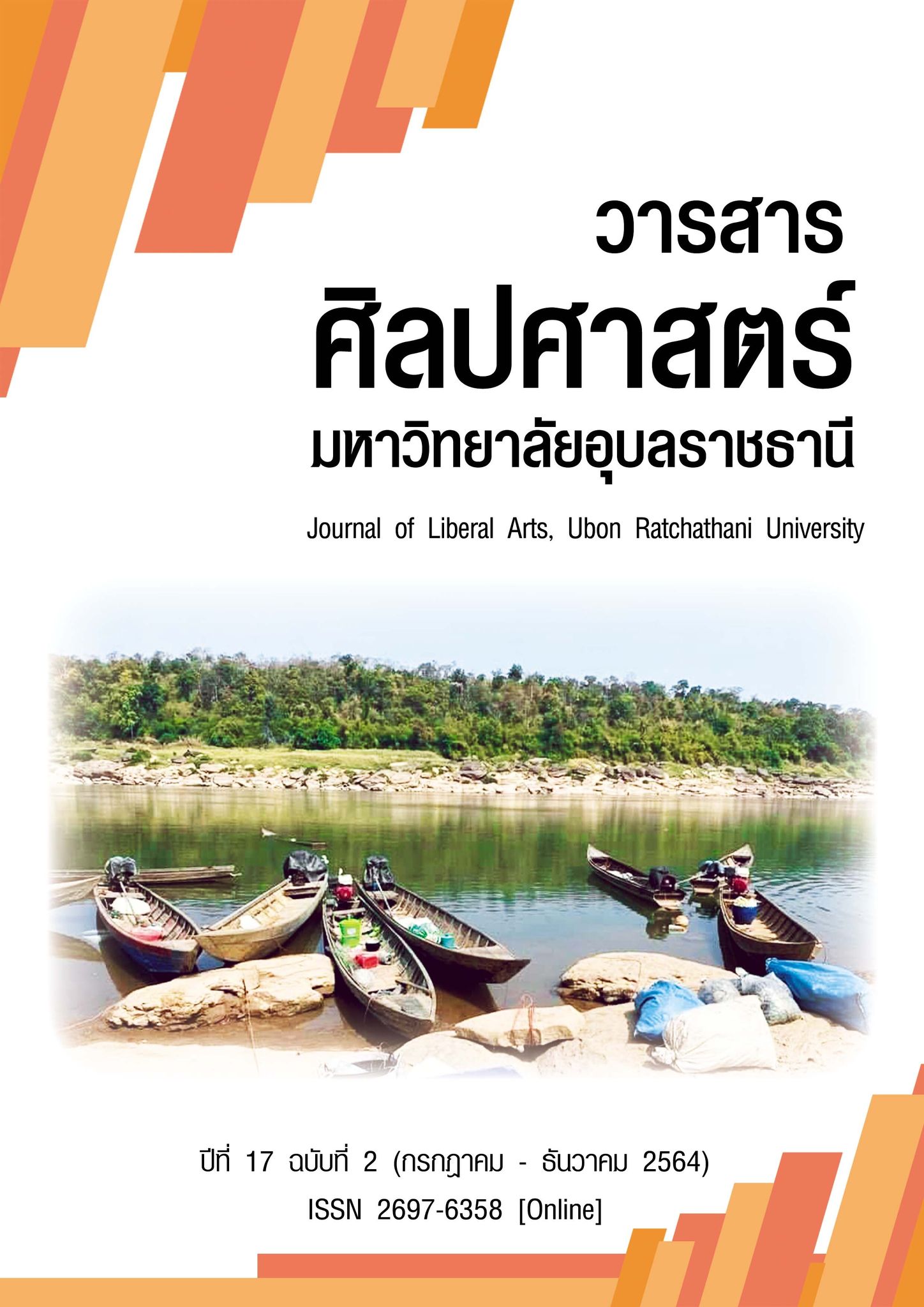การเชื่อมโยงระหว่างทฤษฎีและการปฏิบัติ: การเรียนรู้เชิงประสบการณ์ผ่านการทัศนศึกษา สำหรับนักศึกษาด้านการบริการ
Main Article Content
บทคัดย่อ
งานวิจัยนี้มีวัตถุประสงค์เพื่อสำรวจความเห็นเกี่ยวกับประสบการณ์การทัศนศึกษา ณ โรงแรมระดับ 5 ดาว ของนักศึกษาที่เรียนภาษาอังกฤษในฐานะภาษาต่างประเทศ อีกทั้งศึกษาประโยชน์ของการทัศนศึกษาโดยใช้วิธีวิจัยแบบเชิงคุณภาพในการเก็บรวบรวมข้อมูลจากแบบสอบถามและภาพถ่ายพร้อมคำบรรยาย กลุ่มเป้าหมายคือนักศึกษาชั้นปีที่ 3 จำนวน 50 คน จากมหาวิทยาลัยแห่งหนึ่งในภาคใต้ของประเทศไทย นอกจากนี้ ยังรวบรวมการสัมภาษณ์แบบกึ่งโครงสร้างจากนักศึกษาจำนวน 7 คน หนึ่งสัปดาห์หลังจากการทัศนศึกษา ข้อมูลแบบสอบถามได้รับการคำนวณเพื่อหาค่าเฉลี่ยและส่วนเบี่ยงเบนมาตรฐาน ส่วนข้อมูลจากการสัมภาษณ์และภาพถ่ายพร้อมคำบรรยายได้รับการถ่ายทอดและวิเคราะห์เพื่อตรวจสอบสามเส้ากับข้อมูลค้นพบเชิงปริมาณ ผลการวิจัยพบว่า การทัศนศึกษาส่งเสริมการเรียนรู้จากประสบการณ์ตรงนอกชั้นเรียนและทำให้นักศึกษาตระหนักถึงความสำคัญของภาษาอังกฤษในที่ทำงาน ผลการวิจัยยืนยันว่าการทัศนศึกษากระตุ้นให้ผู้เรียนพัฒนา
ตนเองด้านทักษะภาษาอังกฤษและการวางแผนอาชีพในอนาคต ดังนั้น ผู้สอนและผู้บริหารหลักสูตรในสถาบันการศึกษาต่าง ๆ ควรจัดการเรียนการสอนเชิงประสบการณ์เช่นการทัศนศึกษาลงในแผนการสอนและหลักสูตรเพื่อเป็นประโยชน์สูงสุดต่อผู้เรียน
คำสำคัญ: การเรียนรู้เชิงประสบการณ์ ทัศนศึกษา การเขียนบรรยายใต้รูปภาพ การพัฒนาทักษะภาษาอังกฤษ
Downloads
Article Details
เอกสารอ้างอิง
Discovering common ground in three countries. Curator: The Museum Journal, 49(3), 365-386.
Ballantyne, R., Packer, J., & Axelsen, M. (2009). Trends in tourism research. Annals of Tourism
Research, 36(1), 149-152.
Behrendt, M. (2015). The nature of high school students’ experiences at a Great Lakes Biological Field
Station. International Journal of Learning, Teaching and Educational Research, 10(3), 1-16.
Behrendt, M., & Machtmes, K. (2016). Photovoice as an evaluation tool for student learning on a field
trip. ReseaRch in science & Technological educaTion, 34(2), 187-203.
Bruening, T. H., Lopez, J., McCormick, D. F., & Dominguez, D. R. (2002). Active learning: The impact on
students participating in an extended field trip to Puerto Rico. Journal of Agricultural Education,
43(4), 67-75.
DeMarie, D. (2001). A Trip to the Zoo: Children's Words and Photographs.
DeWitt, J., & Storksdieck, M. (2008). A short review of school field trips: Key findings from the past and
implications for the future. Visitor Studies, 11(2), 181-197.
Coll, S. D., Coll, R., & Treagust, D. (2018). Making the most of out-of-school visits: How does the
teacher prepare? Part II: Implementation & Evaluation of the Learner Integrated Field Trip
Inventory (LIFTI). International Journal of Innovation in Science and Mathematics Education
(formerly CAL-laborate International), 26(4).
Falk, J. H., & Dierking, L. D. (1997). School field trips: Assessing their long‐term impact. Curator: The
Museum Journal, 40(3), 211-218.
Felder, R. M., & Brent, R. (2009). Active learning: An introduction. ASQ Higher Education Brief, 2(4), 1-5.
Goh, E. (2011). The value and benefits of fieldtrips in tourism and hospitality education. Higher
Learning Research Communications, 1(1), 60-70.
Gomez-Lanier, L. (2017). The Experiential Learning Impact of International and Domestic Study Tours:
Class Excursions That Are More Than Field Trips. International Journal of Teaching and Learning
in Higher Education, 29(1), 129-144.
Harsell, D. M., & O‘Neill, P. B. (2010). Experiential learning: Lessons learned from the UND business
and government symposium. American Journal of Business Education (AJBE), 3(8), 27-34.
Knott, V. E., Mak, A. S., & Neill, J. T. (2013). Teaching intercultural competencies in introductory
psychology via application of the Excellence in Cultural Experiential Learning and Leadership
model. Australian Journal of Psychology, 65(1), 46-53.
Kolb, D. A. (2014). Experiential learning: Experience as the source of learning and development. FT
press.
Lima, A., Vasconcelos, C., Félix, N., Barros, J., & Mendonça, A. (2010). Field trip activity in an ancient
gold mine: Scientific literacy in informal education. Public Understanding of Science, 19(3), 322-
334.
Orion, N. (1993). A model for the development and implementation of field trips as an integral part of
the science curriculum. School Science and Mathematics, 93(6), 325-331.
Rohlf, G. (2015). How to Make Field Trips Fun, Educational, and Memorable: Balancing Self-Directed
Inquiry with Structured Learning. The History Teacher, 48(3).
Sanders, D., & Armstrong, E. K. (2008). Understanding students' perceptions and experience of a
tourism management field trip: The need for a graduated approach. Journal of Hospitality &
Tourism Education, 20(4), 29-37.
Tuma, L. A., Janes, P., & Cook, R. A. (2017). The impact of experiential/hands-on international
experiences on hospitality, event, and tourism students. Journal of Hospitality and Tourism
Management, (30), 22-28.
Wilang, J. D. (2017). Silence of Japanese students in a Thai EFL context. In English in South-East Asia
Conference 2017 (DRAL 3/ESEA 2017) (pp. 94-104).
Xie, P. F. (2004). TOURISM FIELD TRIP: STUDENTS'VIEW OF EXPERIENTIAL LEARNING. Tourism Review
International, 8(2), 101-111.


